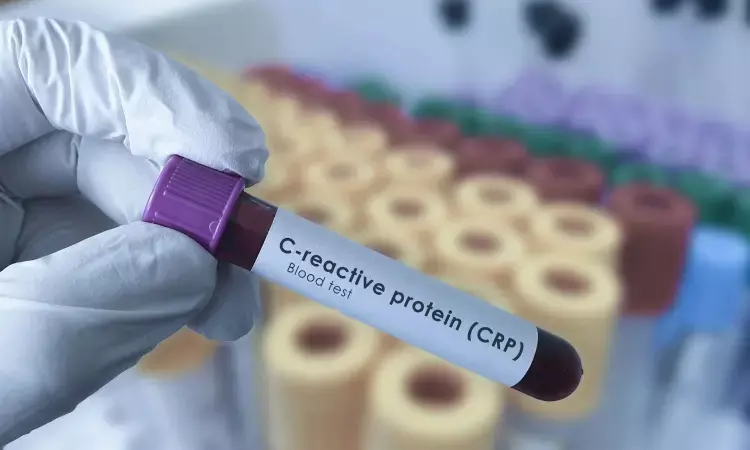- Home
- Medical news & Guidelines
- Anesthesiology
- Cardiology and CTVS
- Critical Care
- Dentistry
- Dermatology
- Diabetes and Endocrinology
- ENT
- Gastroenterology
- Medicine
- Nephrology
- Neurology
- Obstretics-Gynaecology
- Oncology
- Ophthalmology
- Orthopaedics
- Pediatrics-Neonatology
- Psychiatry
- Pulmonology
- Radiology
- Surgery
- Urology
- Laboratory Medicine
- Diet
- Nursing
- Paramedical
- Physiotherapy
- Health news
- Fact Check
- Bone Health Fact Check
- Brain Health Fact Check
- Cancer Related Fact Check
- Child Care Fact Check
- Dental and oral health fact check
- Diabetes and metabolic health fact check
- Diet and Nutrition Fact Check
- Eye and ENT Care Fact Check
- Fitness fact check
- Gut health fact check
- Heart health fact check
- Kidney health fact check
- Medical education fact check
- Men's health fact check
- Respiratory fact check
- Skin and hair care fact check
- Vaccine and Immunization fact check
- Women's health fact check
- AYUSH
- State News
- Andaman and Nicobar Islands
- Andhra Pradesh
- Arunachal Pradesh
- Assam
- Bihar
- Chandigarh
- Chattisgarh
- Dadra and Nagar Haveli
- Daman and Diu
- Delhi
- Goa
- Gujarat
- Haryana
- Himachal Pradesh
- Jammu & Kashmir
- Jharkhand
- Karnataka
- Kerala
- Ladakh
- Lakshadweep
- Madhya Pradesh
- Maharashtra
- Manipur
- Meghalaya
- Mizoram
- Nagaland
- Odisha
- Puducherry
- Punjab
- Rajasthan
- Sikkim
- Tamil Nadu
- Telangana
- Tripura
- Uttar Pradesh
- Uttrakhand
- West Bengal
- Medical Education
- Industry
Higher CRP levels associated with increased risk of kidney stones

China: A recent population-based study published in BMC Nephrology revealed a significant association between higher C-reactive protein (CRP) levels and an elevated risk of kidney stones.
The study stated that in clinical practice, heightened awareness of CRP as a potential biomarker could aid in risk assessment and management strategies for patients with kidney stones.
C-reactive protein is an acute-phase reactant in the circulation that is induced in the liver by pro-inflammatory factors. It plays a role in mediating tissue damage, infections, and inflammatory responses. CRP exhibits a specific relationship with the pathological state of kidney disease, serving as a biomarker for renal pathology.
Studies have weakly correlated CRP with renal stone formation in Japanese men. The mechanism of the inflammatory response in kidney stone formation is poorly understood but may involve reactive oxygen species production and the activation of inflammasomes. There seemed no clarity on the relationship between CRP and the risk of kidney stones development. Therefore, Mei Yang, Department of Endocrine, People’s Hospital of Chongqing Liang Jiang New Area, Chongqing, China, and colleagues aimed to determine whether there is a correlation between C-reactive protein levels and the risk of developing kidney stones.
For this purpose, the research team used data from NHANES 2007–2010. They excluded patients who were under 18 years old and lacked data on CRP and kidney stones. 11,033 participants were finally included. Multivariate regression analysis and subgroup analysis were performed to assess the independent relationship between CRP and kidney stones.
The researchers reported the following findings:
· The mean prevalence of kidney stones among the participants was 9.8%.
· As CRP levels increased, the prevalence of kidney stones exhibited a corresponding rise across quartiles (Kidney stones: Quartile 1: 7.59%; Quartile 2: 8.77%; Quartile 3: 9.64%; Quartile 4: 10.89%).
· CRP was positively associated with the risk of kidney stones (Model 1: OR = 1.09, Model 2: OR = 1.09, Model 3: OR = 1.14).
· Participants in the highest CRP quartile experienced a 69% increased risk of kidney stones compared to those in the lowest quartile (OR = 1.64).
· Interaction tests revealed that gender, diabetes, BMI, hypertension, CKD and smoking or alcohol consumption status did not significantly impact the association between CRP and kidney stones.
"Our study showed that elevated CRP levels were associated with an increased likelihood of kidney stones,' the researchers wrote. They also suggested a similar positive correlation between CRP and kidney stones across BMI, gender, CKD, hypertension, diabetes status, and the absence or presence of alcohol consumption or smoking, and may apply to different population settings.
"However, there is a need for further large prospective studies to validate the findings," they concluded.
Reference:
Liang, D., Liu, C. & Yang, M. The association between C-reactive protein levels and the risk of kidney stones: a population-based study. BMC Nephrol 25, 39 (2024). https://doi.org/10.1186/s12882-024-03476-3
Dr Kamal Kant Kohli-MBBS, DTCD- a chest specialist with more than 30 years of practice and a flair for writing clinical articles, Dr Kamal Kant Kohli joined Medical Dialogues as a Chief Editor of Medical News. Besides writing articles, as an editor, he proofreads and verifies all the medical content published on Medical Dialogues including those coming from journals, studies,medical conferences,guidelines etc. Email: drkohli@medicaldialogues.in. Contact no. 011-43720751


